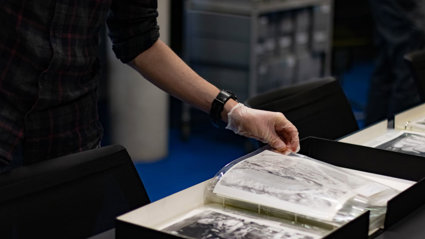
Mapping the seafloor
GLORIA and the Emergence of a Cold War Planetary Imagination, 1965-2002.
Research by Erica Deluchi.
Start: 2025. With Science Museum and Royal Holloway, University of London. PIs: Dr Rachael Squire and Professor Veronica della Dora.
Overview
The Ocean has often, not unproblematically, been described as the last frontier of human exploration on Earth. During the Cold War, British oceanographers used sonar technology – shaped by the demands of national security – to explore and chart the seafloor. Designed in 1965 at Britain’s National Institute of Oceanography, GLORIA (Geological Long-Range Inclined Asdic), a towed sidescan sonar instrument, transformed seafloor mapping.
Surveys revealed features such as tectonic plates for the first time as well as potential oil deposits that paved the way for commercial exploitation in the North Sea and Atlantic Ocean. GLORIA boosted the economic fortunes of the UK via sub-surface resource exploitation and international scientific diplomacy. Yet, despite being a pioneer instrument, it has received surprisingly little scholarly attention.
Whilst mentioned in passing in recent studies (Robinson 2015, 2018), no detailed or critical object history exists of the technology and of the wider imaginaries it enabled. As Oreskes (2003) demonstrates in her tracing of the US Cold War submersible Alvin, oceanographic technologies have extraordinary potential in surfacing narratives and practices that would otherwise be forgotten or unaccounted for.
This project will bring such sensibilities to bear on GLORIA, focusing on the development and use of the technology, and the lives and stories that accompanied it, to bring life to understandings of British oceanography during the Cold War.
In doing so, it will throw light on the 'hidden histories', problematic politics, and networks of people and objects that are currently underrepresented in official historiographies of British oceanography (see award-winning RHUL-RGS project and exhibition Hidden Histories of Exploration, originated in a CDA).